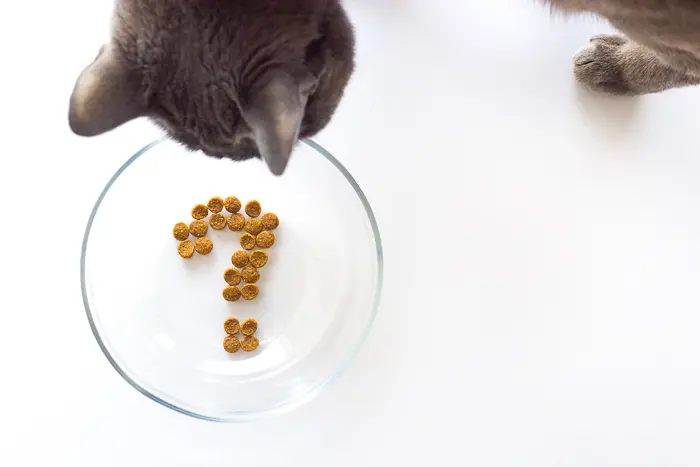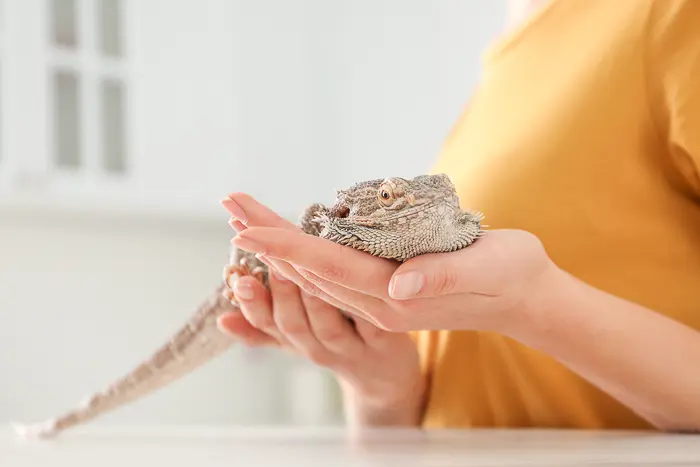We all love our cats. Many of us also love our peanut butter. Wouldn't it be nice of us if we could share our rich, delicious treat with our feline friends? Would it be safe for them to have? Can cats eat peanut butter?
Find out from Dr. Jess in the article below before feeding your cat any type of peanut butter.

What Do Cats Eat?
Movies make it seem that we should feed kittens bowls full of milk to lap up. I do not recommend this – I should write up a completely new article to cover this topic!
We are shown videos and pictures of cats eating mice and other rodents, and offered raw meat as meals and treats.
However, the majority of pet cats in the U.S. are fed commercial pet foods.
Many pet cats eat some form of dry food, like a kibble, which contains very little moisture, usually less than 10% moisture.
Then there are semi-moist foods with a larger water content, and even moist foods with the highest water content of them all. Semi-moist and moist foods usually come in the form of packets or cans when purchased from a pet food supply store.
No matter which form of food your cat eats, your cat will need a well-balanced diet on a daily basis in order to stay happy and healthy.
What Type of Foods Should We Feed Cats?
And remember that cats need a complete and balanced diet, which they can obtain through being offered and eating a complete feed.
A complete feed is one in which the cat gets all of their required nutrients from that food source alone.
The cat's diet does not need supplementation from any other source to supply the correct amount of the correct nutrients.
These complete foods are intended to supply the required nutrients for the average, healthy cat in order for it to continue to lead a healthy lifestyle.
It may not be the best option for a cat with medical issues, as supplementation may be needed.
Whichever complete food you choose for your cat, it needs to have the AAFCO label indicating the diet is complete and balanced for your cat’s life stage.
AAFCO approved foods have gone through testing and compliance to make sure that the diet is safe and healthy for your pet.
Cats already get all the nutrition that they need from their AAFCO-approved kibble or canned food, so anything else is just meant to be given as an optional treat.

Can Cats Eat Peanut Butter?
There's a difference between what a cat can eat and what a cat should eat.
Technically cats “can” eat basic, all-natural peanut butter, as there are no ingredients in it that are known to be toxic to cats.
But peanut butter has no nutritional value in it for them, so cats shouldn't eat it.
In fact, peanut butter may not be the safest food to feed your cat even though they hypothetically could eat it. Let me explain…
Is Peanut Butter Safe For Cats?
Cats should stay away from peanut butter for multiple reasons.
High Fat Content:
One, peanut butter is full of fat.
A high fat treat for most cats is not a good thing as many cats are already overweight.
If your cat is overweight or prone to gaining weight, then think twice before feeding them peanut butter.
Lots of Calories:
Peanut butter has a lot of calories- even more so if there is added sugar in the peanut butter.
Add to the fact that many indoor pet cats have weight problems already, any extra calories are going to lead to even more weight gain.
Additives:
There are plenty of peanut butters out there that add ingredients, whether it is for increased shelf life or flavoring.
However, added chemicals or ingredients may negatively affect your cat, depending on the additive.
For instance, some peanut butter may add xylitol to their peanut butter as a sweetener. But this chemical is very toxic to many animals and should never be given to your pet.
Another added ingredient in many peanut butters is sodium, AKA salt.
Increased salt intake can lead to a multitude of health issues for your cat that you don't want to mess with. So watch that sodium intake!
Other Risks in Feeding Peanut Butter to Cats:
Harmful Reason #1: Loose Stool/Diarrhea
Too much fat can create a hypermotile, or an increase in movement, of your cat's digestive tract.
This hypermotility can lead to loose stool and in some cases, full-blown diarrhea.
Other cats will not be impacted by any additional fat in their diet at all.
Harmful Reason #2: Allergic Reaction to Peanuts
A cat can develop an intolerance or an allergy to any food, so there is always the possibility that your cat is allergic to peanut butter.
If you suspect your cat is allergic to peanut butter , do NOT feed this food to your cat.
If your cat is allergic to peanut butter and accidentally ingests it, go to your nearest animal emergency room immediately.
When this happens, the attack sets off a hypersensitivity reaction and can result in any of the following symptoms:
Common symptoms of adverse/allergic reaction to food:
- Nausea/vomiting
- Diarrhea
- Itching/Increased grooming
- Swelling
- Fever
- Lethargy
- etc.
Harmful Reason #3: Choking Hazards
That's right, even peanut butter can be a choking hazard, especially if your pet is allowed to gobble it down quickly.
Always monitor your cat when they are eating to ensure that if your cat does choke, that you can seek medical attention for them immediately.
Summary:
Even though there is nothing toxic in all-natural peanut butter, you should not feed it to your cat. I repeat, do not feed your cat peanut butter.
There are multiple reasons why peanut butter can be unsafe to your pet, including its high fat and calorie content, and possible additives and added salt or sugar.
So please steer clear of feeding peanut butter to your furry friend- your cat and your veterinarian will thank you for it!

![[Vet Explains Pets]](https://vetexplainspets.com/wp-content/uploads/2024/09/cropped-vetlogo-199x66.png)

